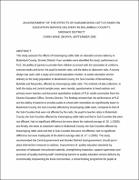| dc.description.abstract | This study assessed the effects of Karamojong cattle raids on education service delivery in Bulambuli County, Sironko District. Four variables were identified for study: performance at PLE; the ability of parents to provide their children at school with the necessities of uniforms, exercise books and lunch; the pupil to teacher ratio; and the desks to classroom ratio. A survey design was used, with a study and control population clusters; to assess education service delivery in the study population in Bulambuli County, the Sub-Counties of Bunambutye, Bukhalu and Muyembe, affected by Karamojong cattle raids. The methods of data collection, in both the study and control sample areas, were namely; questionnaires to head teachers and primary seven teachers and document quantitative analysis of PLE results summaries from the District Education Office, Sironko District. The findings showed that: the performance at PLE and the ability of parents to provide pupils at school with necessities are significantly lower in Bulambuli County, the Sub-Counties affected by Karamojong cattle raids; compared to that of the Sub-Counties that were not affected by the raids; the pupil to teacher ratios in Bulambuli County, the Sub-Counties affected by Karamojong cattle raids and that in Sub-Counties that were not affected, had no significant difference but were above the national average of, 50: 1 (2005); and finally, the desks to classroom ratios in Bulambuli County, the Sub-Counties affected by Karamojong cattle raids and that in Sub-Counties that were not affected, had no significant difference but were inadequate of the district average ratio of, 27: 1 (2005). The study recommended that Central government and Sironko District local government, should put in place intervention measures to address: improvement of quality education standards by provision of adequate instructional materials, strengthening inspection, support supervision and provision of quality teaching staff; minimizing barriers to quality education service delivery by economically empowering the local communities, a school feeding programme for pupils at
school and stopping cattle raids in affected areas; improvement of efficiency of primary education to ensure value for money by strengthening and training of district education management, school management committees and head teachers; improvement of access to primary education that ensures universal and equitable access to basic education by increasing infrastructural development and provision of classrooms, desks, libraries, staff rooms and latrines; and promotion of equity of education that ensures equalization towards eliminating gender, regional and socio-economic imbalances in access to basic education through affirmative action’s and provision of incentives to teachers. These measures should, as much as possible, put the affected Sub-Counties of Bulambuli County in perspective because these affected areas deserve gender responsive development. Interventions should have elements of affirmative action’s to enable the local communities benefit equitable education provisions and be part of the socio-economic transformation processes. | en_US |

